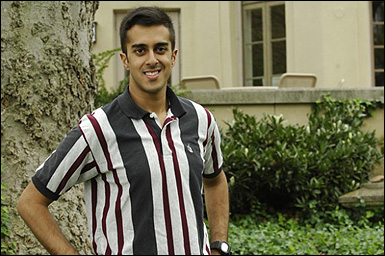Ask Nehal Mehta if he’s learned more inside the classroom over the last four years or outside of it, and his answer is characteristically diplomatic.
“I think it’s a synthesis of the two,” said the senior engineering science and economics double major. Mehta will graduate summa cum laude on May 13.
“The opportunities I pursued outside of class provided perspective and context to what I was learning in class. That is what has defined the Vanderbilt experience for me.”
 Nehal Mehta (Anne Rayner/Vanderbilt) |
As a freshman, Mehta signed up to participate in Vanderbilt’s Alternative Spring Break program “on a whim.” He now calls ASB “one of the best things I could have possibly been involved in.”
That first spring break he travelled with a group of fellow students to Monterrey, Mexico, where, in an effort to better understand immigration and poverty issues, they lived among the homeless in a transitional housing center. Mehta recalls the dinnertime conversation he shared with an elderly resident one evening.
“He had tried to come into the U.S. many times illegally,” Mehta said. “Hearing his story allowed me to empathize with his situation and his reasons for doing what he did. I credit that experience for putting a human face on what had otherwise been an academic issue for me.”
As a sophomore, Mehta was a site leader for an ASB trip to Guatemala. On the long drive to Xela, high in the Sierra Madres, he befriended the group’s van driver, who related his own struggles to raise the funds – as much as $30,000 – to come to the United States. Mehta was able to draw parallels between the driver’s story and what he had learned in his Latin American economic development class back at Vanderbilt.
Junior year Mehta led an ASB site along the Texas-Mexico border at Casa Esperanza, a detention center that provides young people with schooling and English-language training while they wait out the legal immigration process. This year, while serving as co-chair of ASB’s executive board, Mehta participated in the Urban Plunge – 48 hours spent living among the homeless on the streets of Washington, D.C.
“Seeing poverty at the international level, seeing immigration issues first-hand, seeing what motivates people to risk life and limb and incredible financial assets to come to the U.S., seeing America’s homeless and the issues we face in our nation’s capital – these things have cemented what I learned in the classroom,” Mehta said. In turn, the marriage of curriculum and hands-on experience has helped shape his worldview.
“I view society as having three core pillars: infrastructure, the economy and the legal system,” said Mehta, who has pursued his education accordingly. Mehta has done a 3-2 program at Vanderbilt. His first three years were spent completing his bachelor’s degrees in engineering and economics, and he’s currently finishing up year one of the two-year MBA program at Vanderbilt’s Owen Graduate School of Management. Mehta also plans to attend law school in the future. All of this is in preparation of a larger goal.
“Long term, I want to be involved in nation building – taking developing nations and pushing them forward – and I think a background in these areas will best position me for that.”
In the short term, Mehta will pursue a different commitment – one that will take the Kingsport, Tenn., native even farther from home. As a member of Vanderbilt’s Reserve Officers’ Training Corps, he has served as commander of the “Go Gold” battalion and ranks in the top 10 percent of all ROTC cadets nationwide. Next year Mehta will begin three years of active duty service in the U.S. Army that will likely include deployment to the Middle East. After that he wants to transition to the Army Reserves and serve as a Civil Affairs officer.
“Those are the soldiers that sit down with local village elders to discuss what U.S. forces can do to engender more favorable relations,” Mehta explained. “That seems like the coolest mission in the world.”
Mehta sees the issues he cares about as transcending allegiance to a particular political party.
“At a deeper level, they are human issues,” he said. “Providing economic growth to another nation and helping incite their development has very real benefits and positive externalities for our nation.
“I’m all about the extension of opportunity, because I think that opportunity is the key driving force of the human spirit,” Mehta said. “You just need a catalyst to help people over the hurdle, and they’ll take it from there.”